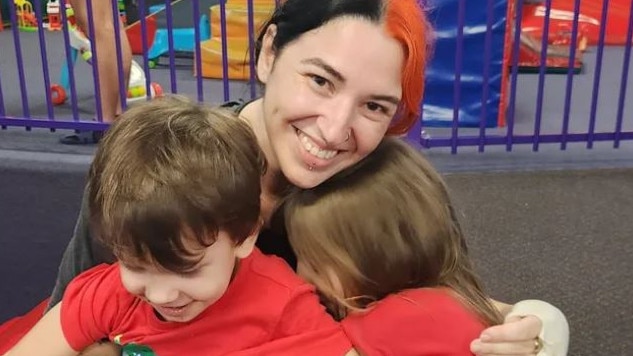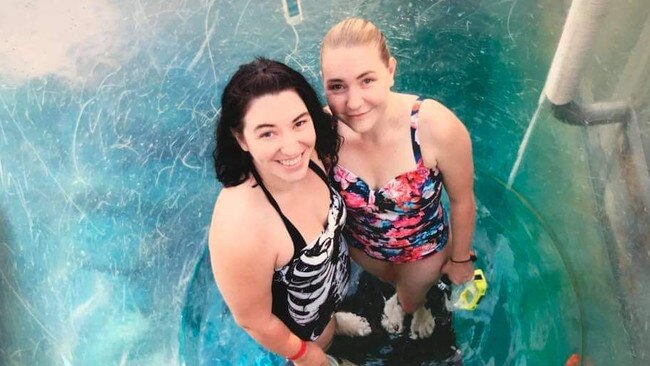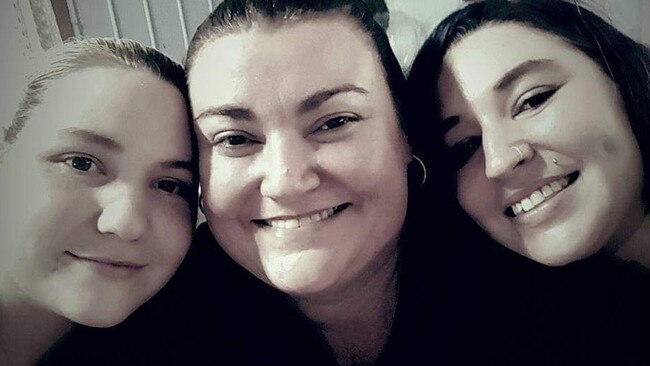Tiffany Kelly: Palmerston early learning educator faces uncertain future amid neurological diagnosis
In the space of a month, this Palmerston early learning educator went from fit and healthy to barely able to walk and speak. And with no public neurologist appointments available, she faces an uncertain outlook.

Northern Territory
Don't miss out on the headlines from Northern Territory. Followed categories will be added to My News.
Last month, Palmerston woman Tiffany Kelly, 33, an early childhood educator and single mother of two, got the shakes.
She hasn’t been able to stop since.
If it were just the shakes, she possibly could have continued being a mum to Kaiden, 3, and Annelise, 8, and kept up her job at Zuccoli Early Learners.
But it wasn’t just shakes: Ms Kelly can now only move further than a few steps with the aid of a wheelchair, her brain is shrouded in fog, her body ripples with uncontrollable tremors, and she can only speak with the greatest of difficulties, each syllable stammered out five or six times before the word is finally squeezed out.
This is Ms Kelly’s life after her shock diagnosis in January with Functional Neurological Disorder (FND), the causes of which are unknown to medicine.
“It just happened so quickly,” Ms Kelly said of her fortnight-long transition from happy and healthy, albeit with a vague pain that may or may not have heralded the dark spectre of FND, to a woman with no capacity for independence.
“I just want to get back to me.”
However, returning back to the old Ms Kelly, which will involve an array of therapists working in concert to reteach her brain the basic movements of life, will not be so simple, thanks to a gummed up public hospital system.

“When I was discharged, they sent me a referral to the neurology team at Palmerston [Regional] Hospital,” Ms Kelly said.
“But when I call Palmerston hospital, all they’ve been able to tell me is they’ve got my referral and I’m on a wait list and I have to be triaged and they can’t give me a time frame.
“I’m going to try and see if I could look to pay for a physio just in the meantime.
“Even if I can at least walk and talk I can get back to almost being myself, back to work, and being a mum to my children.”
Her mum, Candice Kelly said it has been difficult watching her daughter turn into a shadow of her former, vibrant self.
“It’s really hard to see,” Candice said.
“The only thing I can do is help her and support her as much as I can.

“It’s one of those awful things as a mum, you’re powerless to do anything to help.
“It breaks your heart but you’ve got to keep strong.
“Tiff’s a fighter.”
An online GoFundMe fundraiser established by Zuccoli Early Learners to support Ms Kelly pay for “ongoing bills and medical expenses” has so far raised more than $2000.
“We want her to have one less worry on her mind during her recovery, and be able to get back to being an amazing mum to Annie [Annelise] and Kaiden, and educator to all the children here,” the fundraiser states.
FND can cause “sometimes debilitating” functional motor impairments, including limb weakness, tremors, dystonia (abnormal posturing), gait disorders, and dysphagia (difficulty swallowing), according to FND Australia.
Other symptoms can include dissociative attacks that can mirror epileptic seizures, chronic pain, fatigue, and difficulty with cognitive function, such as poor memory and concentration.
“FND is like a glitch in the software of the brain [which can] cause the hardware to function abnormally and react differently to the environment,” FND Australia says.
Treatment is via a multidisciplinary approach featuring physiotherapists, psychologists, occupational therapists, speech pathologists and social workers.
According to a 2022 article in the Medical Journal of Australia, the prevalence of FND in the Australian community is “unknown,” although it is a “common neurological condition anecdotally”.





